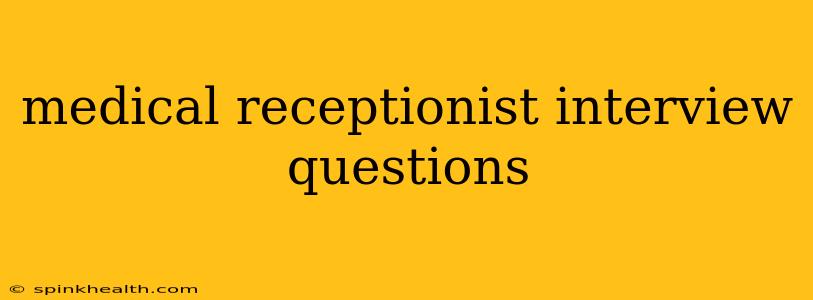Decoding the Doctor's Office: Aceing Your Medical Receptionist Interview
The sterile scent of antiseptic, the hushed whispers of worried patients, the constant hum of activity – the medical receptionist is the heart of the clinic, the first point of contact, the calming voice in a storm of appointments and emergencies. Landing this role requires more than just a pleasant smile; it demands a unique blend of skills and personality. This guide will walk you through the most common medical receptionist interview questions, offering insights into what interviewers are really looking for, and how to craft compelling answers that leave a lasting impression.
This isn't just about reciting your resume; it's about showing how your experience and personality perfectly align with the demands of the job. Think of it as a conversation, not an interrogation. Be genuine, be enthusiastic, and be ready to showcase your potential.
1. Tell me about yourself and why you're interested in this position.
This isn't an invitation to recount your entire life story. Instead, focus on relevant experiences and skills that showcase your suitability for the role. For example, did you work in customer service, demonstrating your ability to handle stressful situations and maintain composure under pressure? Did you manage scheduling or appointments in a previous role? Highlight those achievements and connect them directly to the requirements of a medical receptionist. Express your genuine interest in the medical field – even a personal anecdote about a positive experience with healthcare professionals can make a difference.
2. What are your strengths and weaknesses?
This classic interview question is your chance to shine. Choose strengths directly relevant to the job, such as excellent communication skills, strong organizational abilities, proficiency in medical terminology (if applicable), and experience with medical software. For weaknesses, choose something you're actively working to improve, demonstrating self-awareness and a commitment to professional development. Don't choose a critical weakness (like being unreliable); instead, select something manageable, like public speaking, and explain the steps you're taking to overcome it (e.g., joining a Toastmasters club).
3. How do you handle stressful situations?
Medical reception areas can be chaotic. Expect a question probing your ability to navigate high-pressure environments. Describe a past situation where you effectively managed stress, emphasizing your problem-solving skills, prioritization techniques, and ability to remain calm and professional under pressure. Perhaps you successfully de-escalated a tense situation with a frustrated patient or managed multiple urgent requests simultaneously. Highlight your resilience and ability to remain composed even amidst the chaos.
4. How do you handle difficult patients or challenging situations?
Patience is a virtue for any medical receptionist. This question assesses your ability to deal with upset or demanding patients. Share examples of how you've de-escalated conflict, maintained professionalism, and provided excellent customer service, even when faced with difficult individuals. Emphasize active listening, empathy, and finding solutions that satisfy both the patient and the clinic's needs.
5. Describe your experience with medical software or electronic health records (EHRs).
Many clinics utilize specialized software. If you're familiar with EHR systems like Epic, Cerner, or Allscripts, highlight your experience. Even basic familiarity with appointment scheduling software or patient management systems is valuable. If you lack extensive experience, express your willingness to learn and adapt quickly. This shows initiative and a proactive approach to learning new technologies.
6. Are you comfortable with multitasking and prioritizing tasks?
The medical receptionist juggles a multitude of responsibilities. Describe your experience multitasking and prioritizing tasks. Give specific examples from previous roles, illustrating how you efficiently manage competing demands, meet deadlines, and stay organized. Mention specific techniques you use, such as to-do lists, prioritization matrices, or time management strategies.
7. How do you maintain patient confidentiality?
Protecting patient privacy is paramount in healthcare. This question tests your understanding of HIPAA regulations and your commitment to confidentiality. Describe your experience maintaining patient confidentiality, emphasizing adherence to privacy policies and protocols. Mention specific measures you've taken to protect sensitive information, such as secure password practices, careful handling of documents, and understanding the limitations of sharing information.
8. What are your salary expectations?
Research the average salary for medical receptionists in your area before the interview. Be prepared to give a range reflecting your experience and qualifications. It's best to avoid giving a single number – a range provides flexibility and allows for negotiation.
9. Do you have any questions for me?
Always prepare questions to ask the interviewer. This shows your interest and engagement. Ask about the clinic's culture, the team dynamics, opportunities for professional development, or specific challenges the role presents. Avoid questions easily answered on the clinic's website. Thoughtful questions demonstrate your initiative and genuine interest in the position.
By preparing thoughtful answers to these common medical receptionist interview questions, you'll significantly increase your chances of securing your dream job. Remember, it's not just about the answers; it's about presenting yourself as a confident, capable, and compassionate individual ready to contribute to the smooth running of a busy medical practice. Good luck!

